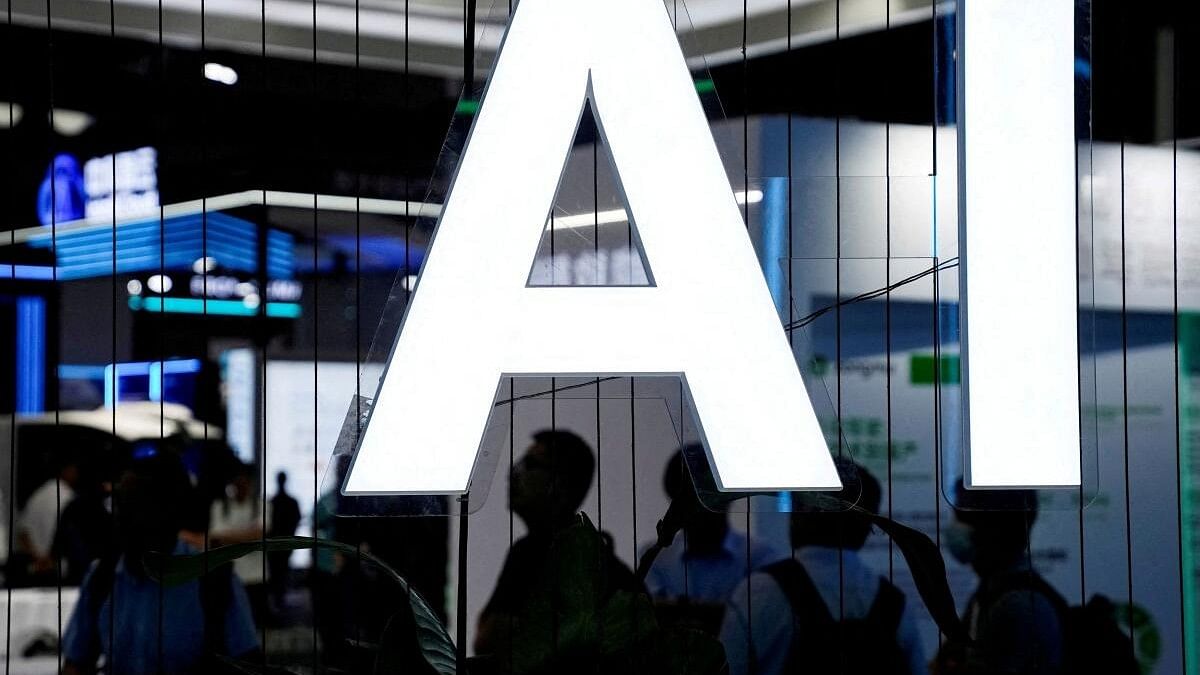
Integrating technological innovations like Artificial intelligence (AI) further optimises renewable energy systems. AI is a transformative technology with the potential to optimise the potential of renewable energy systems like solar panels and wind turbines and ensure stable and regular energy availability.
Credit: Reuters Photo
With the year 2030 just half a decade away, many nations are intensifying their efforts to meet the Sustainable Development Goals (SDGs) outlined in the 2015 Paris Agreement. However, amid recovery from pandemic-induced inequalities, poverty, and economic slowdowns, several countries in the Global South, including India, are grappling with balancing carbon emissions reduction and meeting escalating energy demands.
The solution often lies in optimising the potential of renewable energy systems, harnessing sources like sunlight, wind, water, tides, waves, and geothermal heat. To ensure that this shift is inclusive, it is imperative that we emphasise the potential of the Productive Use of Renewable Energy (PURE), which means utilising renewable energy to enhance the income and welfare of all, especially the vulnerable, to promote inclusive growth and development.
India's Pradhan Mantri Kisan Urja Suraksha Evam Utthan Mahabhiyan (PM KUSUM) exemplifies PURE. This initiative facilitates income generation for farmers by installing solar power plants on their infertile land, enabling access to solar power for irrigation, decarbonising the agricultural sector, and ensuring stable income streams for rural landowners. PURE goes beyond clean energy generation, focusing on enhancing income, diversifying employment opportunities, and improving lifestyles.
Integrating technological innovations like Artificial intelligence (AI) further optimises renewable energy systems. AI is a transformative technology with the potential to optimise the potential of renewable energy systems like solar panels and wind turbines and ensure stable and regular energy availability. This helps reduce the dependency of communities on fossil fuels and increases their access to energy. Uninterrupted access to energy in remote areas holds the power to transform the lives of the locals. AI can play a pivotal role in reducing renewable energy production costs as it boosts system efficiency, optimises resource allocation, and reduces operational expenses, making renewable energy more affordable to rural communities and promoting inclusive and equitable development while helping nations achieve their climate goals. Using AI in the energy sector requires skills in operation, maintenance, manufacturing, and installation, thus creating green jobs. One major area where AI can help is by predicting demand and supply, which reduces grid loss and incentivizes the operator to provide renewable energy in rural areas.
However, integrating AI at the macro-level poses challenges. Understanding the existing applications of AI and its implementation and exploring other potential uses requires skill building and access to finance and resources. The optimum productive use of renewable energy is achieved when it benefits marginalised, vulnerable, and remote populations. One such target community is the people residing in the Hindu Kush Himalaya (HKH) region. Although the region has a massive hydropower potential of about 500 GW, it is one of the most vulnerable and energy-poor areas. The HKH region stretches 3,500 km from Afghanistan in the west to Myanmar in the east, covering all or a portion of eight nations. Approximately 400 million people in the HKH countries still lack basic access to electricity, and more than 80% of the rural population, many of whom reside in mountainous areas, relies on traditional biomass fuels for cooking. There are many challenges to setting up renewable energy in the HKH region. It is remote and inaccessible, with variable climatic conditions and limited grid connectivity. It has been excluded from mainstream development, financing, and investment opportunities. The region is also a biological hotspot, and the setting up of new renewable energy projects here raises concerns over the destruction of ecosystems and the loss of habitats. But these challenges also create opportunities for AI.
AI technologies, such as machine learning and remote sensing, can analyse geospatial data and topographical information to identify optimal areas for renewable energy projects in the HKH region. By accurately forecasting energy demand and generation patterns, AI optimises renewable energy system operation, ensuring energy security in the region. Additionally, AI can support community engagement and facilitate inclusive decision-making processes by providing stakeholders with data-driven insights, visualisations, and scenario analysis. This will empower local communities and promote participatory approaches to renewable energy planning and development in the HKH region.
Utilising and integrating AI with renewable energy systems in remote regions will enhance its productive use by improving the energy security of the locals, strengthening the agricultural sector, which is the mainstay of most of the population, and creating green jobs. Access to affordable, clean energy is expected to boost the tourism sector too, leading to overall economic prosperity in the region.
AI technologies have the potential to enhance the planning, implementation, and operation of renewable energy projects, addressing technical, financial, and socio-economic challenges and contributing to sustainable energy access, resilience, and development in mountainous and rural communities. HKH countries can realise the potential of renewable energy and its productive use in meeting global climate goals and commitments. PURE and AI can play an imperative role in meeting their long-term goals of achieving net zero by 2070.
(Anand Madhukar is Assistant Professor and Programme Coordinator (Climate Science & Policy), and Ananya Mohan is a master’s student at TERI School of Advanced Studies, New Delhi)